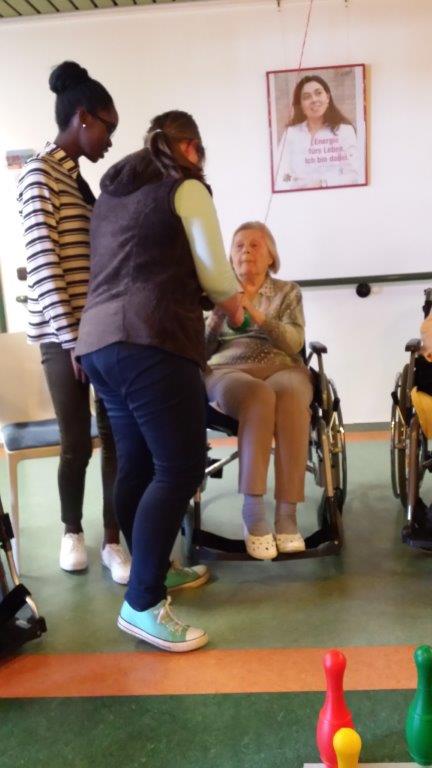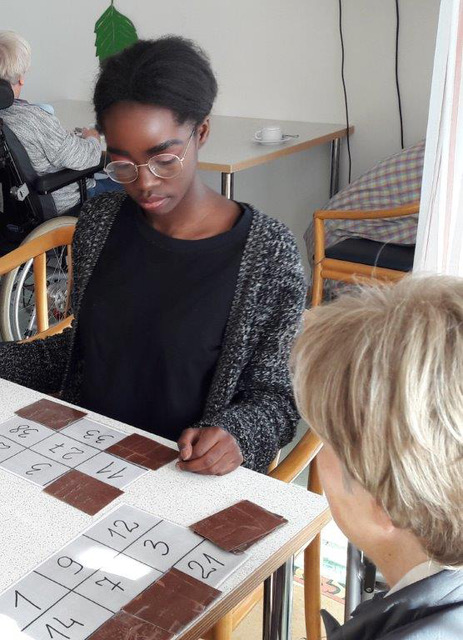A living bond between the generations
A cooperation between a senior citizens’ home and a secondary school
by Heike Hupe, Cologne
Looking back, I have very fond memories of a project with my secondary modern school students in a retirement home. For almost four years, I visited a senior citizens’ home once a month with some of my students in a permanent working group in the afternoon after school. We spent the afternoon telling stories, doing handicrafts, singing, celebrating and talking, among other things, about the experiences of the elderly during the war.
I think I have achieved my goal of getting the students excited about social engagement. However, far beyond my imagination, the project has provided us all with enriching experiences, broadened our horizons, sparked strengths and ideas within us and deepened our relationships with each other. It made me even more aware of the original task of my beautiful profession. For example, the task of the teacher to introduce the children and young people to the world of adults, to teach them the importance of the older generation and the natural respect for it.
Both sides, the seniors and the young, were so surprised, moved and happy at each meeting, as I had not suspected. My exhaustion from the morning also disappeared and I always went home exhilarated and invigorated afterwards.
Many senior citizens in our society live in senior citizens’ homes and no longer have anyone close to them who visits them, takes an interest in their life experiences, listens to them and accompanies them in their often difficult last stage of life. Due to the nursing shortage, nurses can hardly meet the needs of the elderly. Thus, many seniors become lonely, increasing depression and pain. They live isolated from the following generations, no longer experience the liveliness of young people and know little of their problems. So they also have no opportunity to pass on their experience, their advice and the serenity of old age.
The young people, for example my students at the secondary school, often lack self-confidence, good relationships and support as well. They have little confidence in learning at school. In addition, the influence of the media and possibly drug abuse make it difficult for them to engage in meaningful activities and make positive human bonds.
At the weekly meetings, I could observe how the old people felt addressed by the young ones and how they were pleased. The enthusiasm of the students, their increasing confidence in themselves due to the joy of the senior citizens and the helping activities in dealing with the often weakened people were also obvious.
In the young people’s reports on their experiences with the project, it becomes clear how they were able to grow and how comfortable they felt.
Emotional significance of the project for the students
A few weeks before the end of their school years, the young people reported on their years of engagement at the senior citizens’ home in an interview for the Bürgerfunk (Citizens’ radio) of the local radio station.
They told about our activities, their observations and sensations and reflected on the importance of the project for them personally. They especially underlined the nice and cosy atmosphere in the residential group and the appreciation of the resident assistant, who had taken the students very much to her heart. I was very touched by their reasons for staying so long and amazed when they expressed their feelings so clearly and distinctly. I will give a few examples:
- “We had many nice moments. I enjoyed being able to laugh with the seniors and had funny moments.”
- “During the meetings, I felt joy and excitement. Because, when I looked closer at the seniors, I noticed how excited they were when they saw us. A little smile came out on many of them.”
- “In the beginning we were insecure and didn’t know exactly how to act. But we got older and got more and more experience and confidence.”
- “I felt a sense of being trusted. The seniors and staff at the citizens’ home trusted us with the things we did with the elderly.”
- “The staff there, especially our contact person, respected us. They accepted us as we are, no matter what colour skin or nationality you have. It felt good.”
- “We had fun and enjoyed seeing and making the seniors happy.”
- “There I was surrounded by something positive and calm, which made myself calmer and more composed.”
- “We will take our experiences with us into life and pass them on to friends, relatives, our children.”
Our activities
In the following I would like to explain some of our activities in more detail. Each meeting started with a group coffee. The students sat among the seniors and talked about school and private experiences. Some seniors were then able to pick up the thread of conversation, others listened and followed along. The resident assistant and I were always there to help keep the conversation going.
One focus was the seasonal handicrafts. I provided the materials and under my guidance the students did the crafts with one senior each. Depending on their ability, the seniors could work along or just select material by colour or arrangement and otherwise watch. But even this watching and the little conversations along the way filled them with joy. The finished products were always well received and then decorated the common room.
The play afternoons were also very popular, where we played Mensch-ärgere-dich-nicht (Man, Don’t Get Angry), bingo, senior citizens’ bowling or guessing games. The mood among both the residents and the young people was cheerful and very lively.
We were in charge of the programme for parties and celebrations in the residential group. The students recited poems, read cheerful short stories, one student played the keyboard and thus had the wonderful experience of being able to present his skills in front of the community. Or my ex-colleague accompanied us with his guitar so that we could sing songs together.
Our group was invited to special events. For example, to the carnival session or to the summer party on a Saturday afternoon. Every time, students from our group came, even on a Saturday, and we celebrated together with the seniors and contributed to a cheerful mood.
A special conversation
In 9th grade, we dealt with the topic of National Socialism in history lessons. I took the opportunity to give the young people an understanding of this time with its human suffering through personal conversations with contemporary witnesses. Three senior citizens were willing to talk to us. With great empathy and thoughtfulness, the young people thought of questions, and we discussed and debated the subjects of this afternoon.
The students were insecure at the beginning and approached the topic cautiously. The senior citizens talked about their childhood during the war, about many hardships and fears and also losses. One of the senior citizens was very moved, but with my help, we were able to include her into the conversation again and again. For the young people it was a challenging and moving afternoon, from which they went home thoughtfully and with great appreciation for the old ladies.
A contribution to important life decisions
During the eight years of cooperation with the senior citizens’ home, many students decided to do a voluntary social year or an apprenticeship there.
One boy, for example, got to know the senior citizens’ home in the 9th school year and regularly went to a senior citizens’ residential group once a week.
In his last year of school, 10th grade, he did everything he could to be able to continue his visits. He saw his vocation in this occupational field, did an apprenticeship as a geriatric care assistant in another home for the elderly, then returned to our cooperative house to do another apprenticeship as a geriatric nurse. Since he felt very strengthened by the activity and the human experiences, he gave a speech of thanks at the end of his school days, which he probably would not have been able to do before. In this way, our project was able to help some young people taking a meaningful life decision and thereby giving a valuable contribution to the common good.
One of the students in my group of five also decided to start an apprenticeship there as a geriatric nurse.
In my current volunteer work, I sometimes meet former students of our school who are successfully completing their training or are already working there. Every time it is a warm encounter.
Looking back
Looking back, I can say that the cooperation work with the senior citizens’ home was a very fulfilling and inspiring activity. On one hand, because I was successful in giving some of the students concrete job prospects. On the other hand, because I was able to experience so much commitment, enthusiasm, responsibility, perseverance and joy among the students.
Especially because of the continuity with the permanent working group over four years, I was able to address the students in such a way that my joy, enthusiasm and appreciation for our joint activities sparked off. The young people thus showed openness for interpersonal experiences and commitment. They were able to overcome reservations and cultivate respectful, empathetic contact. They could feel their importance, matured in their personality and experienced reliable relationships. They were able to anchor their values. The young people developed great respect for the life achievements of the older generation, and the “dialogue of the generations” was thus promoted and experienced. •

